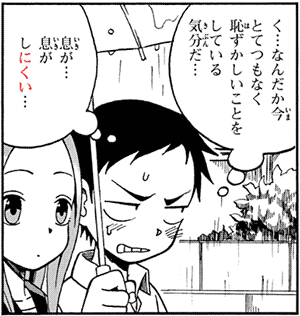Manga: Karakai Jouzu no Takagi-san からかい上手の高木さん (Chapter 7, 傘)
Usage
Since nikui is an auxiliary adjective, it comes after the masu stem of verbs, also called the "connective form," ren'youkei 連用形.- suru
する
To do. - shi-masu
します
To do. (polite.) - shi
し
Doing. - shi-nikui
しにくい
shi-nikui
し難い
Doing is hard.
Hard to do.
Since nikui is an auxiliary adjective it turns the verb into an adjective. In particular, nouns that would become objects (marked by wo を) can end up becoming subjects (marked by ga が).
- shigoto
仕事
Work. (noun.) - shigoto wo suru
仕事をする
To do the work. (the work is object.) - shigoto ga suru
仕事がする
The work does. (this makes no sense.) - shigoto ga shi-nikui
仕事がしにくい
The work is hard to do. (predicative adjective.) - {shi-nikui} shigoto
しにくい仕事
Work [that] {is hard to do}. (attributive adjective.)
Since it turns the verb into an adjective, sometimes the English translation is just one single adjective word rather than a whole phrase. For example:
- yomu
読む
To read. - yomi-nikui
読みにくい
Hard to read.
Illegible.
Conjugation
The word nikui can be conjugated like an i-adjective.- nikui
にくい
Hard [to do]. - nikukatta
にくかった
Was hard [to do]. - nikukunai
にくくない
Is not hard [to do]. - nikukunakatta
にくくなかった
Was not hard [to do].
See the Conjugation of i-Adjectives for details.
Homonyms
There's a couple homonyms you should be aware of.Nikui 憎い
The first one, nikui 憎い, surely looks like nikui 難い, but is written with a different kanji, and is totally a different word. This nikui 憎い doesn't mean "hard," it means "detestable."To have an idea, some similar words include:
- nikumu
憎む
To hate. To detest. - nikushimi
憎しみ
Hatred.
Minikui 醜い vs. 見にくい
With the verb is "to see," miru 見る, the polite form would be mimasu 見ます, thus "hard to see" would be minikui 見にくい.Note, however, that most of the time minikui means something else entirely:
- minikui
醜い
Ugly. Unsightly.
This word is actually also written as minikui 見憎い, with the "detestable" nikui. So it essentially means "seeing [it] is detestable." Because it's so ugly you don't want to see it.
-gatai ~難い
The word -nikui written with kanji is -nikui ~難い, which is rather confusing, since -gatai ~がたい, another auxiliary suffix that means something is "hard to do," may also be written with kanji as -gatai ~難い.Generally speaking, however, both words tend to be written with hiragana.
"Hard" in Japanese
Note that not every time you have the word "hard" in English you have the word -nikui ~にくい in Japanese."Hard" Difficulty
To refer to the difficulty of something, the word used is muzukashii 難しい.- kore ga muzukashii
これが難しい
This is difficult.
This is hard.
"Hardware"
A lot of times the katakanization of the word "hard," haado ハード, is used to say "hard." This is specially the case of the "hard" difficult level in games, and words loaned from English, for example:- haadowea
ハードウェア
Hardware. - haado boirudo
ハードボイルド
Hard-boiled. - haado dhisuku
ハードディスク
Hard-disk.
"Hard," i.e. Not Soft
To say something is "hard," as in, it's "not soft," the word used would be katai 硬い. Note that this word can be written with multiple, different kanji:- katai
硬い
Hard. Solid.- Antonym:
- yawarakai
軟らかい
Soft. (e.g. pillow.)
- katai
固い
Rigid. Inflexible.
Fixed. Immovable.- Antonym:
- nurui
緩い
Loose.
Lax
- katai
堅い
Firm. Solid.- Antonym:
- moroi
脆い
Brittle. Fragile.
Examples
- wakari-nikui
分かりにくい
Hard to understand.
Incomprehensible.
(e.g. Evangelion.)- wakaru
分かる
To understand.
- wakaru
- atsukai-nikui
扱いにくい
Hard to handle.- atsukau
扱う
To handle.
- atsukau
- kaki-nikui
書きにくい
Hard to write. (e.g. love letter.)
Hard to write with. (e.g. brush.)- kaku
書く
To write.
- kaku
- souzou shi-nikui
想像しにくい
Hard to imagine.- souzou suru
想像する
To imagine.
- souzou suru
- kangae-nikui
考えにくい
Hard to think. Hard to conceive.
Unthinkable. INCONCEIVABLE!!!- kangaeru
考える
To think.
- kangaeru
- ii-nikui
言いにくい
Hard to say.- iu
言う
To say.
- iu
息がしにくい
Manga: Karakai Jouzu no Takagi-san からかい上手の高木さん (Chapter 7, 傘)
- ku... く・・・
*vexed noises* - nandaka ima
なんだか今
[It seems that] now. - {{totetsumonaku
hazukashii} koto wo
shite-iru}
kibun da...
とてつもなく恥ずかしいことをしている気分だ・・・
[I have] a feeling [that] {[I] am doing something {extremely embarrassing}}. - iki ga...
息が・・・
[My] breathing... - iki ga
shi-nikui
息がしにくい・・・
[It feels] hard to breathe...- iki wo suru
息をする
To do breathing.
To breathe.
- iki wo suru
Further Reading
See Also
- -dzurai ~づらい
Another auxiliary adjective that means "hard to do," but is used subjectively instead of objectively.
References
- 固い、硬い、堅いの違い!それぞれの対義語は?使い分け方もチェック! - 違いは.net, accessed 2010-01-09.
Difference between katai words.

No comments: